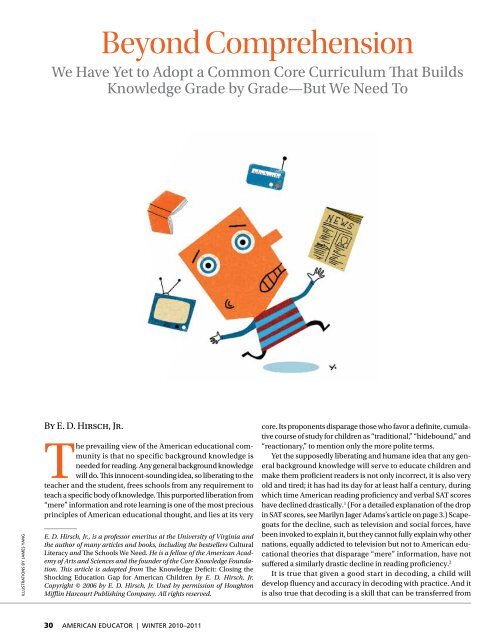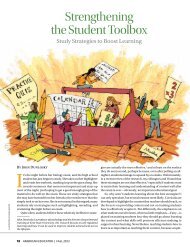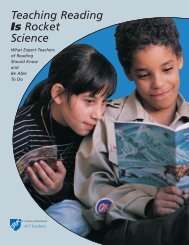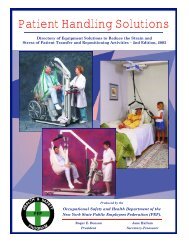American Educator, Winter 2010-11, Vol. 34, No. 4, AFT
American Educator, Winter 2010-11, Vol. 34, No. 4, AFT
American Educator, Winter 2010-11, Vol. 34, No. 4, AFT
Create successful ePaper yourself
Turn your PDF publications into a flip-book with our unique Google optimized e-Paper software.
ILLUSTRATIONS BY JAMES YANG<br />
Beyond Comprehension<br />
We Have Yet to Adopt a Common Core Curriculum That Builds<br />
Knowledge Grade by Grade—But We Need To<br />
By E. D. Hirsch, Jr.<br />
The prevailing view of the <strong>American</strong> educational community<br />
is that no specific background knowledge is<br />
needed for reading. Any general background knowledge<br />
will do. This innocent-sounding idea, so liberating to the<br />
teacher and the student, frees schools from any requirement to<br />
teach a specific body of knowledge. This purported liberation from<br />
“mere” information and rote learning is one of the most precious<br />
principles of <strong>American</strong> educational thought, and lies at its very<br />
E. D. Hirsch, Jr., is a professor emeritus at the University of Virginia and<br />
the author of many articles and books, including the bestsellers Cultural<br />
Literacy and The Schools We Need. He is a fellow of the <strong>American</strong> Academy<br />
of Arts and Sciences and the founder of the Core Knowledge Foundation.<br />
This article is adapted from The Knowledge Deficit: Closing the<br />
Shocking Education Gap for <strong>American</strong> Children by E. D. Hirsch, Jr.<br />
Copyright © 2006 by E. D. Hirsch, Jr. Used by permission of Houghton<br />
Mifflin Harcourt Publishing Company. All rights reserved.<br />
30 AMERICAN EDUCATOR | WINTER <strong>2010</strong>–20<strong>11</strong><br />
core. Its proponents disparage those who favor a definite, cumulative<br />
course of study for children as “traditional,” “hidebound,” and<br />
“reactionary,” to mention only the more polite terms.<br />
Yet the supposedly liberating and humane idea that any general<br />
background knowledge will serve to educate children and<br />
make them proficient readers is not only incorrect, it is also very<br />
old and tired; it has had its day for at least half a century, during<br />
which time <strong>American</strong> reading proficiency and verbal SAT scores<br />
have declined drastically. 1 (For a detailed explanation of the drop<br />
in SAT scores, see Marilyn Jager Adams’s article on page 3.) Scapegoats<br />
for the decline, such as television and social forces, have<br />
been invoked to explain it, but they cannot fully explain why other<br />
nations, equally addicted to television but not to <strong>American</strong> educational<br />
theories that disparage “mere” information, have not<br />
suffered a similarly drastic decline in reading proficiency. 2<br />
It is true that given a good start in decoding, a child will<br />
develop fluency and accuracy in decoding with practice. And it<br />
is also true that decoding is a skill that can be transferred from





